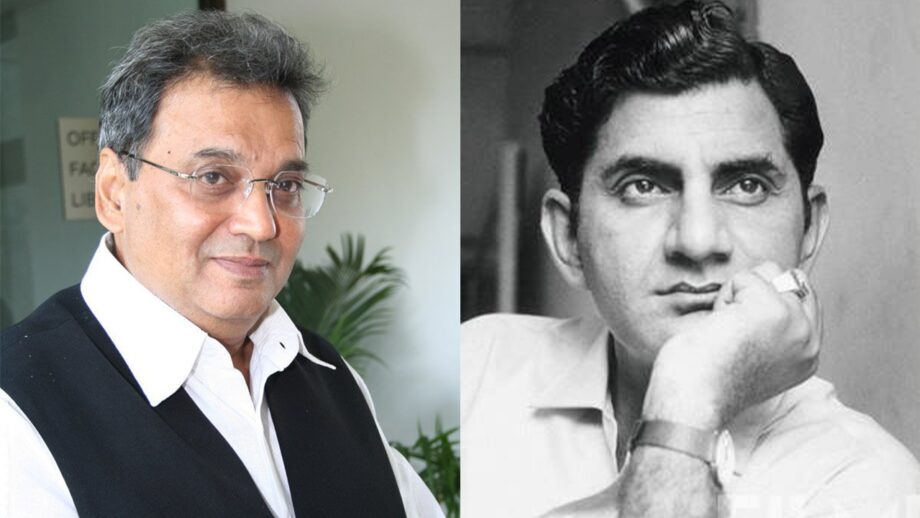Anand Bakshi who wrote more than 4500 lyrics during his long career of 40 years, out of which at least 3000 songs were superhit. Bakshi Saab wrote the lyrics of 16 film produced and-or directed by Subhash Ghai.
Ghai has been researching for a documentary on Bollywood’s most prolific bard for a decade.
In an interview with me Ghai had said ,”I am in the process of putting together the pieces of Bakshi Saab’s life. But yes, I don’t want to make a dry boring staccato documentary that no one would watch. This was a man who wrote some of the most entertaining songs for our films. I want the documentary on Bakshi Saab to be seen by generations that have not grown up with Bakshi’s Saab’s words in the mouth, as we have.”
Ghai wanted to humanize Bakshi in the documentary. “I’ve put together a team of like-minded Bakshi fans. We’re not going to only praise him with boring monotony in the documentary. We will bring out his human side even if it means opening up some uncomfortable questions about creative property.”
It is believed that some of Bakshi’s most popular numbers attributed to renowned composers, were actually Bakshi’s tunes.
Ghai in the same interview with me Ghai had spoken of Anand Bakshi’s deep-rooted and far-reaching impact on Hindi film music. “He had a storehouse of Punjabi numbers from his childhood. Many of the superhit Punjabi-styled songs he wrote were secretly composed by him, for example ‘Bindiya Chamkegi’ (the 1970 chartbuster sung by Lata Mangeshkar for the film Do Raaste which has officially been credited to Laxmikant-Pyarelal). He had a vast knowledge of music and songs. In fact he was keen to become a singer and had sung a duet ‘Baghon Mein Bahaar Ayee’ for the film Mome Ki Gudiya with Lataji.”
Bakshi spent hours discussing his poetry and his life with Ghai.
Recalls Ghai emotionally, “Bakshi Saab began writing all my lyrics from my third onwards Gautam Govinda. We began as professionals. Then we became a team. Then he was my friend and finally my brother. I know exactly how his mind and heart worked.”
Apparently, Bakshi was unhappy for his lyrics not being acknowledged for their poetic quality.
Says Ghai, “You must understand Bakshi Saab was a lyricist first, then a poet. He understood the requirement of film lyrics better than any other lyricist. The songs had to be integrated into the script. I’d narrate all my screenplays to Bakshi Saab and he would immediately start writing out the songs into my screenplay. That’s how close we were. While other great lyricists like Sahir Ludhianvi, Javed Akhtar and Gulzar came into lyric-writing as poets, Anand Bakshi was a lyricist first then a poet. And what poetry he wrote! People didn’t seem to realize that his simple words conveyed the most profound truth about existence. Take Bakshi Saab’s ‘Sari Duniya Ka Bojh Hum Uthatay Hai Log Aate Hain Log Jaate Hain Hum Wohi Pe Khade Reh Jaaate Hain’ in Manmohan Desai’s Coolie. This was not just a song about a porter. It expressed a profound truth about life.”
To Ghai it was remarkable how much Bakshi understood the film song. “Bakshi Saab was a proud film lyricist. So much so that when he used the poetry by poets as a starting point to his lyric, he would acknowledge the source within the song, for example ‘Beshaq Mandir Masjid Todo, Bulleshah Yeh Kehta, Par Pyar Bhara Dil Kabhi No Todo Iss Dil Mein Dilbar Rehta’. In this song for Raj Kapoor’s Bobby, Bakshi acknowledged the contribution of Bulleshah.”
Ghai has a startling anecdote to tell about the song ‘Ek Rut Aaye Ek Rut Jaaye Mausam Badle Na Badle Naseeb’ that Bakshi wrote for Ghai’s Gautam Govinda.”
Recalls Ghai, “The song was filmed on Shashi Kapoor. When Raj Kapoor Saab (Shashi’s brother) saw it, he sought out my phone number and called to congratulate me for the way it was shot. I told Raj Saab I did nothing…it was the way the song was written. If I had messed it up, I’d have never forgiven myself.”


